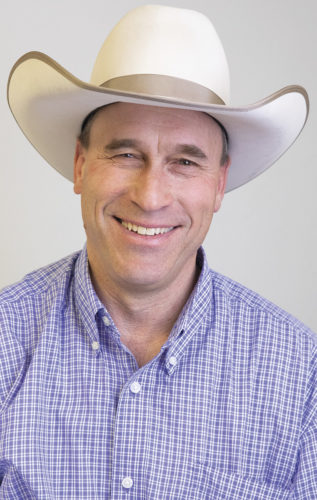When I hollered at him to knock it off, the dog quit his nonsense and the horse jumped up, just like you’d expect a horse that just got roused from a good nap to do. He’d picked sort of an odd place for his nap, but other than that, I didn’t think there was too much out of the ordinary.
I always get a little spooked when I see a horse sprawled out on his side. I don’t know how many times in my life I’ve gotten a knot in my gut when I’ve noticed a sleeping horse. I swear, there’s no more dead-looking live critter than your favorite horse in a blissful slumber in the middle of the horse pasture while the other horses are grazing all around him.
Even though I always have faith that it’s no more than a sleeping horse, I have never been able to keep myself from giving a sharp whistle so I can see the ears perk up to assure me I’m messing with a good equine dream and not witnessing the demise of a trusted steed.
I didn’t think much more about it until 20 minutes later, when I spotted Douglas, the same pretty but oddly named buckskin gelding, stretched out 20 yards from where I’d seen him earlier. This time, as I walked over to him, I knew something was amiss.
Douglas was always one of those horses that, when he saw a halter in your hand, felt the need to run three laps around the pen before he’d face up and let you catch him. It was always the same routine, and I eventually learned to let him pull his little power play before I’d get after him to put the whoa on.
After his three laps, I could holler once to him and he’d stop and walk up to be haltered. This time, however, as I walked over to him, all he did was lift his head. I yelled over at the house for my son, Stensen, to grab a halter. We had some walking to do. Douglas obviously was having some issues with colic.
I gave him a dose of banamine, and Stensen and his younger brother, Peyton, spent the next two hours walking the horse around the yard and up and down the road in front of the house. He seemed to improve a little bit and wasn’t so eager to try to lie down and roll, so I had hopes that he was recovering.
I spent most of the night checking on him, walking him if I thought he needed it and praying that he’d come out of it. At 5:30 AM, he was in a hard sweat and he lay down on his side, in obvious pain and unwilling to stand up.
My hope was he’d just stay in that position, and that he’d be OK until I could get the vet to come out. I figured I could give the vet a call at 6:00.
I went in the house to let my wife know the situation, and before I could even think about picking up the phone, I heard a horse squeal and the dog bark. When I ran back out, I found old Doug with his head facing the opposite direction from where I had left him and in his death throes.
Like a sentimental old lady who just lost her 15-year-old poodle, I let a few tears come as I kneeled down and put his head in my lap and he took his last few breaths. Then I went back in the house to break the news to the family – another casualty of living, a byproduct of life.
None of us had much of an appetite for breakfast this morning. In the space of four weeks, we’d lost two dogs and a horse, as well as at least three young calves and a cow we’d found dead on the mountain, apparent victims of the dry, dusty conditions and larkspur poisoning, respectively.
As much as I didn’t want to, I kept replaying last night, last week, last month over and over in my head. Why didn’t I call the vet that night? I should not have let the horse go down that last time.
Why didn’t we ride a couple more times in the low country to check for sick calves? Could we have salted that unit differently to keep the cows out of the larkspur? Why did I let the dog loose on the morning the neighbor kid hit him on his way to early morning weight lifting? Blah, blah, blah, regret after regret, question after question.
You know, every once in a while you’ll hear some quote, usually attributed to some all-important celebrity or overpriced athlete, about how, despite their trials, they don’t have any regrets about how they’ve lived their lives.
With all due respect, that’s a line of steer stew I’m not buying. I’ve got a saddlebag full of regrets. But I think I’ve come to the realization that regrets can serve a very useful purpose – but only if we allow them to fulfill that purpose.
I think the good Lord wants us to have regrets. He doesn’t expect us to be perfect, yet. But He does expect us to keep trying – even after we’ve screwed up.
I think that’s all part of the plan. So, I’ll go on, working my way through this journey as best I can. I’ll try to keep my regrettable moments to a minimum, but when I do something worthy of a regret, I’ll hopefully regret it only once. ![]()







